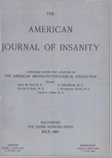Abstract
No adequate explanation can be offered by us for the occurrence of prolonged non-hypoglycemic coma in the six cases reported. Intensive treatment with thiamin chloride, nicotinic acid and with riboflavin failed to terminate the coma. Nicotinic acid apparently brought about a striking change in Case 2. This effect was not, however, on the initial coma but on a state of confusion associated with redness of the tongue many days after the coma had subsided. Despite prophylactic administration of these vitamins, which play important rôles in carbohydrate oxidation and in the absence of recognized signs of danger, patients undergoing insulin shock therapy sometimes fail to awaken from hypoglycemic coma when the hypoglycemia is terminated. This distressing complication sometimes arises even in patients who have not reached a level of deep coma or shock and who have been in coma or shock only for very short periods.
Though nearly all of the procedures recommended in this emergency were carried out, no favorable effect was noted except in one instance when potassium chloride administration was followed by a prompt cessation of severe convulsive activity.
Prolonged coma is to be regarded as a serious complication which not infrequently terminates fatally. Aside from pulmonary edema it has been the only dangerous complication that we have experienced in the use of insulin shock therapy.
In the two reported cases which came to autopsy no adequate cause could be found for the failure to awaken.
The status of patients in prolonged coma varies widely. Some may show only a mildly clouded consciousness and appear to be in excellent physical condition for many days but nevertheless proceed to a fatal termination.
Since prolonged coma is at present an unpredictable complication and a very dangerous condition, opportunities to devise therapy are sporadic and limited. It seems worth while to make use of any harmless measure that offers a chance of success even on purely theoretical grounds. We therefore feel that it would be advisable to administer potassium to all patients who develop this complication. The possibility of favorable results from the use of lipocaic should be investigated. It is suggested that this preparation be used in cases of prolonged coma, on theoretical grounds, whenever the occasion arises.
Since riboflavin and nicotinic acid are no less important in carbohydrate metabolism than thiamin chloride and since the demand for them is also increased during insulin therapy it is suggested that they, as well as thiamin chloride, be used prophylactically in all cases undergoing treatment.

